Israel military confirms strike on Gaza ambulance, claims used by Hamas
6 min readThe Israeli military confirmed it targeted an ambulance outside Gaza’s largest hospital Friday, claiming it was being used by Hamas while health officials said it was transporting the wounded.
Israeli “aircraft struck an ambulance that was identified by forces as being used by a Hamas terrorist cell in close proximity to their position in the battle zone,” a military statement said.
World Health Organisation Tedros Adhanom Ghebreyesus said he was “utterly shocked” by reports of attacks on ambulances evacuating patients close to Al-Shifa hospital in Gaza, leading to deaths, injuries and damage.
“We reiterate: patients, health workers, facilities, and ambulances must be protected at all times. Always,” he said in a post.
The health ministry in Hamas-run Gaza said on Friday Israel targeted a convoy of ambulances leaving Al-Shifa Hospital in Gaza City.
Israel’s military said on Friday it was looking into the report. Reuters could not immediately verify the report.
“We have informed the Red Cross in accordance with the international law about moving a convoy carrying injured people in ambulance vehicles from Al-Shifa hospital,” Ashraf Al-Qudra, the health ministry spokesman, said in a statement.
“At the gate of the hospital and then at the Ansar square, the occupation targeted the convoy in more than one location outside Al-Shifa hospital.”
The statement made no mention of any casualties. Hamas-affiliated Al-Aqsa TV had earlier quoted the ministry as saying scores and had been killed and injured.
Israel can get back captives through negotiations, says Hezbollah chief
Israel can get back captives held in Gaza through negotiations, Hezbollah leader Sayyed Hassan Nasrallah said on Friday in his first public comments since the Palestinian group Hamas and Israel went to war.
“What is happening in Gaza shows Israel’s foolishness and inability because what they are doing is killing children and women,” he said in a speech that was live streamed on Al Jazeera.
The speech is expected to be scrutinised for clues on how the group’s role in the conflict might evolve. A formidable military force backed by Iran, Hezbollah has been engaging Israeli forces along the border, where 55 of its fighters have been killed in the deadliest escalation since it fought a war with Israel in 2006.
He started his speech by praising “the fallen martyrs” of his group and the other groups fighting Israel, as well as the civilians killed.
“I start by offering my deepest condolences to the families of the fallen here in Lebanon, and at the same we congratulate you as your loved ones have won the honour of martyrdom.”
The Hezbollah chief offered condolences and congratulations to the families of those killed in Gaza and the occupied West Bank, according to the Qatar based news outlet.
He described the ‘Al-Aqsa Flood operation’ as an earthquake in Israel while saying that it had strategic and existential repercussions.
According to the Hezbollah chief, the attacked confirmed that Iran does not exercise any guardianship at all over the resistance factions and the real decision-makers were the leaders of the resistance.
“The great Al-Aqsa Flood operation was decided and implemented 100 percent Palestinian. Absolute secrecy is what ensured the success of the Al-Aqsa Flood operation on October 7,” Nastallah said, “we were not bothered by Hamas’s concealment of the October 7 attack plan.”
He was of the view that conditions in Palestine in recent years had been extremely harsh.
He accused the US of being entirely responsible for the war in Gaza and described Israel as an “executive tool”.
Nasrallah went on to add that Israel could not offer a single military achievement, adding that Hamas’s operation established a new “historical phase” in the battle with Israel.
He called the Palestinian group’s decision to launch Al-Aqsa Flood right, “wise and courageous”. One of Israel’s biggest mistakes was setting goals that it cannot achieve, Nasrallah added.
According to Nasrallah, the ongoing battle in Gaza was not like previous one and urged everyone to bear the responsibility.
He outlined two goals: stop the war in Gaza and Hamas is victorious in this war.
He revealed that Hezbollah entered the battle on October 8, a day after Hamas launched its surprise attack in southern Israel.
He shared that 57 Hezbollah fighters have been killed so far.
Nasrallah called on Arab and Muslim states to cut all gas, oil and food supplies and exports to Israel.
He reiterated that all options in the Lebanese front were open.
“Hezbollah is ready for all possibilities,” Nasrallah said and added that the group was not intimidated by the US deployment of warships in the region.
But he advised all those who wanted to prevent the regional war, must be “quick”.
On the eve of the speech, Hezbollah mounted what appeared to be its biggest attack yet in more than three weeks of fighting, saying it launched 19 simultaneous strikes on Israeli army positions and using explosive drones for the first time.
Israel responded with air strikes along with tank and artillery fire as the fighting on the border escalated.
However, with the clashes so far mostly contained to the frontier, Hezbollah has still only drawn on a fraction of the firepower with which Nasrallah has been threatening Israel for years.
Many people in Lebanon were anxiously awaiting the 3pm (1300 GMT) speech, rattled for weeks by fear of a catastrophic conflict. Some say they are not making plans beyond Friday, believing his remarks will signal the chances of escalation.
The speech is also being anticipated more widely. Nasrallah is a leading voice in a regional military alliance established by Iran to counter the United States and Israel.
Known as the “Axis of Resistance” it includes Iraqi militias which have been firing at US forces in Syria and Iraq, and Yemen’s Houthis, who have waded into the conflict by firing drones at Israel.
Nasrallah is one of the most prominent figures in the Arab world.
Recognised even by critics as a skilled orator, his speeches have long been followed closely by friend and foe alike. He is deemed a terrorist by adversaries including the United States.
His fiery speeches during the 2006 war elevated his profile, including one in which he announced Hezbollah had struck an Israeli naval vessel with an anti-ship missile, urging viewers to “look to the sea”.
Overseeing the battle
While Nasrallah has stayed out of the public eye since Oct 7, other Hezbollah officials have indicated the group’s combat readiness. But they have not set any red lines in the conflict with Israel.
Asked on Oct 22 why he had yet to speak, Hezbollah politician Hassan Fadlallah said Nasrallah was following the situation in Gaza “moment by moment and hour by hour” and overseeing the battle in Lebanon. Not speaking in public was “part of his management of the battle”, he said.
The speech will be broadcast to coincide with rallies called by Hezbollah to honour fallen fighters.
Mutual threats of destruction have deterred Israel and Hezbollah from waging war across the Lebanese-Israeli frontier since 2006. Syria has meanwhile served as an arena for their conflict.
Sources familiar with Hezbollah’s thinking say the group’s attacks so far have been measured to avoid a big escalation, while keeping Israeli forces busy at the border.
Lebanon can ill afford another war with Israel. Many Lebanese are still reeling from the impact of a catastrophic financial collapse four years ago.
Israel has said it has no interest in a conflict on its northern frontier with Lebanon.
Prime Minister Benjamin Netanyahu has warned Hezbollah against opening a second war front with Israel, saying that doing so would bring Israeli counter-strikes of “unimaginable” magnitude that would wreak devastation upon Lebanon.
For the latest news, follow us on Twitter @Aaj_Urdu. We are also on Facebook, Instagram and YouTube.



















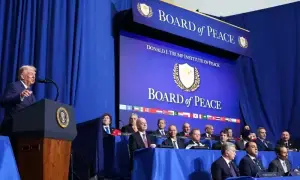

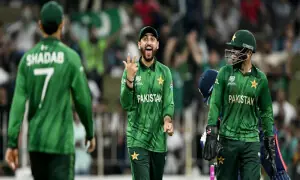

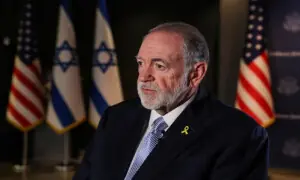
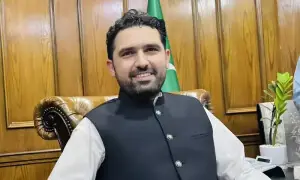

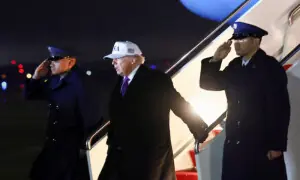
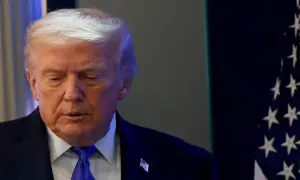
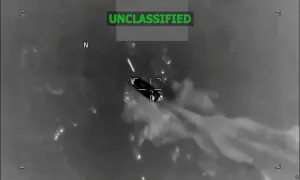
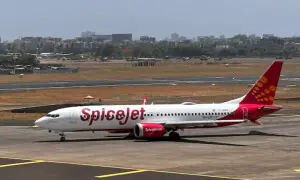
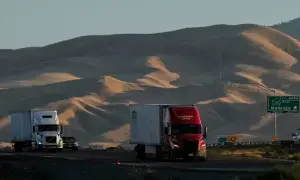
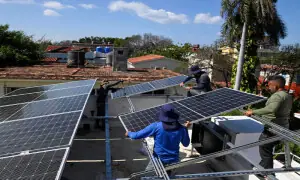
Comments are closed on this story.